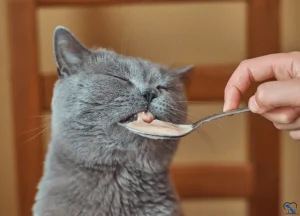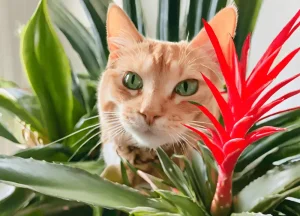Cat sneezing can result from allergies, infections, or foreign bodies. To stop it, identify and address the underlying cause promptly.
Cats, much like humans, may sneeze for a variety of reasons, ranging from the benign to the serious. A sudden sneeze might simply be your feline friend reacting to a bit of dust or a strong perfume. However, frequent sneezing may signal underlying health issues that require attention.
As a pet owner, understanding these causes is crucial for maintaining your cat’s well-being. Introducing the topic with relevance and empathy, this article dives into the common reasons behind a cat’s sneezing and provides actionable advice on how to alleviate this symptom, ensuring your pet remains happy and healthy. By keeping track of your cat’s sneezing patterns and environmental factors, you can better communicate with your veterinarian to find a solution.
Common Reasons For Cat Sneezing
Cat sneezing is a symptom that can leave many owners worried. Just like humans, cats sneeze for a variety of reasons. Some are simple, like a tickle in their nose. Others could signal a health concern. Below, we explore three common triggers for your furry friend’s sneezes.
Upper Respiratory Infections
Just as colds are common in humans, upper respiratory infections (URIs) often cause cat sneezing. URIs are comparable to the common cold, but in cats. They can stem from viral or bacterial infections. Common viruses include feline herpesvirus and calicivirus. Symptoms besides sneezing can include runny eyes, nasal discharge, and fever. If you suspect a URI, a vet visit is necessary.
Allergies
Cats, like people, suffer from allergies. Pollen, dust, mold, perfumes, and even certain cat litters can be culprits. Watch for seasonal sneezing or reactions after you clean your home. An important clue is itchy skin along with sneezing. Reducing allergens and consulting a vet for allergy medications can help.
Foreign Objects
Cats are curious creatures. This curiosity sometimes leads to them sniffing or playing with objects that can become stuck in their nostrils. Grass blades, small toys, or even threads are examples. Consistent sneezing or pawing at the nose could indicate a foreign object. A vet visit is crucial to safely remove the item.
What to Do:
- Keep clean surroundings: Dust and clean regularly.
- Observe your cat: Notice sneezing patterns and possible triggers.
- Seek professional help: Always consult a vet if sneezing persists.

Serious Causes Of Cat Sneezing
When your cat starts sneezing frequently, it’s time to pay attention. While occasional sneezes may be harmless, regular sneezing can indicate a serious issue. Understanding the root causes is crucial for your cat’s health. Let’s explore serious causes of cat sneezing that warrant a visit to the vet.
Feline Herpesvirus
Feline Herpesvirus, often called feline viral rhinotracheitis (FVR), is a common cause of sneezing in cats. While it sounds scary, it’s essentially the cat version of a cold. Symptoms can range from mild to severe and include:
- Persistent sneezing
- Runny eyes or nose
- Fever
- Lethargy
Cats catch this virus through contact with infected salvia, discharge, or even water bowls. Isolation and supportive care are necessary to stop its spread.
Feline Calicivirus
Feline Calicivirus is another viral infection that can trigger sneezing. Its symptoms often resemble those of the herpesvirus, including:
- Sneezing
- Runny nose
- Conjunctivitis
- Ulcers on the tongue
This virus spreads through direct contact or contaminated objects, like food bowls. Treatment usually involves managing symptoms and preventing secondary infections.
Both conditions are highly contagious among cats. A vet visit is essential to confirm diagnosis and receive a proper treatment plan. Vaccines can prevent these illnesses, so ensure your furry friend is up-to-date on their shots.
Environmental Triggers For Cat Sneezing
A sneezing cat can be more than just a cute interruption; it may signal environmental sensitivities. Our fluffy friends react to a variety of triggers in their surroundings. Identifying these can help us reduce discomfort and maintain our cat’s health.
Dust And Pollen
Dust and pollen are widespread irritants that often go unnoticed. These particles float in the air and can inflame a cat’s sensitive nasal passages. Consider these points:
- Regular cleaning reduces dust accumulation
- Keep windows closed during high pollen days
- Air purifiers can help minimize airborne allergens
Cigarette Smoke
Another common irritant for cats is cigarette smoke. This harmful environmental element can provoke sneezing and more severe respiratory issues. To ensure your cat’s wellbeing:
- Avoid smoking indoors
- Smoke far from common cat areas
- Regularly air out spaces to disperse lingering smoke

Dangers Of Untreated Cat Sneezing
Ignoring your cat’s sneezes might seem harmless at first glance, but these minor symptoms could signal underlying health issues that may escalate if left unaddressed. Being aware of the potential dangers associated with untreated cat sneezing will help you protect your feline friend from more serious complications. Let’s explore the risks.
Potential Secondary Infections
A sneezing cat is often prone to infections. Nasal discharge might attract bacterial growth. Without treatment, these bacteria can lead to secondary infections such as sinusitis or pneumonia. These conditions can significantly affect your cat’s health. Immediate veterinary care can prevent these severe outcomes.
- Bacterial rhinitis
- Chronic sinusitis
- Pneumonia
Compromised Immune System
Continuous sneezing could indicate a weakened immune system. Cats fighting off one infection may struggle with others. Their bodies are less effective at warding off future illnesses. Proper diagnosis and timely treatment enhance your cat’s defenses, ensuring a quicker and more robust recovery.
| Sign | Meaning |
|---|---|
| Persistent sneezing | Immune challenge |
| Other symptoms appear | Potential immune system issue |
Home Remedies To Ease Cat Sneezing
Is your beloved feline friend sneezing more than usual? Sneezing can be common in cats, but sometimes it needs attention. Home remedies are a gentle way to help reduce your cat’s sneezing. Let’s explore some simple steps to give your cat relief.
Use Of Humidifier
Dry air might irritate your cat’s nasal passages. A humidifier adds moisture to the air, soothing your cat’s nose. Set up a humidifier in the room where your cat spends most of its time. Keep it clean to prevent mold.
Regular Grooming
- Brush your cat regularly to reduce dander and pollen
- Use grooming time to check for nasal blockages
- Wipe your cat with a damp cloth after outdoor adventures

When To Seek Veterinary Care
A sneezing cat may seem cute but it can signal health issues. Love and care for your cat means knowing when to get help from a vet.
Persistent Sneezing
Sneezes that don’t stop need a vet’s check-up. Cats sneeze for many reasons. Constant sneezing isn’t normal. Look for these signs:
- Over 24 hours of sneezing
- Sneezing that grows in frequency or intensity
- Changes in behavior or appetite
These could mean an infection, allergies, or something stuck in their nose.
Accompanied By Discharge
Clear or colored nose goo tells you something’s off. Clear discharge is often allergies. Yellow or green discharge might be infection. Watch the eyes too. Any gunk there? Time for a professional opinion.
| Discharge Type | What It Could Mean |
|---|---|
| Clear | Allergies or irritants |
| Colored | Potential infection |
| Eye gunk | Eye infection or irritation |
Breathing troubles or coughing also mean a vet visit. These signs often go with discharge. Quick vet trips can keep minor problems from getting worse.
Diagnostic Tests For Cat Sneezing
Is your furry friend sneezing more than usual? Understanding why cats sneeze can be puzzling. Sneezing in cats can be a sign of various conditions. To unravel the mystery, vets often recommend diagnostic tests. Let’s explore the common tests that help diagnose the reasons for a cat’s sneezes.
Nasal Swab
One of the first steps is a nasal swab. This simple procedure collects samples from your cat’s nose. The sample helps detect infections, viruses, or allergies. Vets gently insert a swab into the nose to collect mucus. This sample then goes to a lab for analysis.
- Quick and non-invasive
- Identifies infectious agents
- Can pinpoint specific allergens
Blood Tests
Blood tests provide a deeper look into your cat’s health. With a small blood sample, vets can assess your cat’s overall condition. Diseases, immune responses, or organ issues can cause sneezing. Blood tests help rule out or confirm such causes.
| Test Type | What It Checks |
|---|---|
| Complete Blood Count | Infection or inflammation levels |
| Immunologic Tests | Immune system health |
| Biochemistry Profile | Organ function |
These tests usually take little time. Results guide vets toward the right treatment.
Treatment Options For Cat Sneezing
Treating your cat’s sneezing starts with understanding why it’s happening. Cats can sneeze for various reasons. Some might need simple home care. Others might need a vet’s help. Let’s explore what treatment options are available for your feline friend.
Antibiotics
If your cat’s sneezing is due to a bacterial infection, antibiotics could be the answer. Your vet will likely prescribe these. It’s important to finish the full course of medication. Let’s look at reasons vets prescribe antibiotics:
- Upper respiratory infections (URI): Common in cats, URI comes from bacteria.
- Secondary infections: Sneezing can cause other infections, treated with antibiotics.
Antihistamines
For cats sneezing from allergies, antihistamines can provide relief. They reduce sneezing and nasal discharge. Remember, only give treatments under vet guidance. Common antihistamines for cats include:
| Medication | Function |
|---|---|
| Diphenhydramine | Controls histamine reactions |
| Loratadine | Reduces allergy symptoms |
Frequently Asked Questions
What Triggers Sneezing In Cats?
Common triggers include irritants like dust, pollen, or pepper. Chemicals, strong perfumes, and smoke can also provoke sneezing. In some cases, underlying health issues such as respiratory infections or allergies could be the cause.
Can Food Allergies Cause Cat Sneezing?
Yes, food allergies can lead to sneezing in cats. Alongside sneezing, food allergies might also cause gastrointestinal issues or skin irritations. If food allergies are suspected, a vet consultation for allergy testing is advised.
Is Cat Sneezing A Sign Of Infection?
Sneezing can be symptomatic of a respiratory infection in cats. Viral infections, like the feline herpesvirus or feline calicivirus, are commonly at fault. If sneezing is persistent or accompanied by discharge, seek veterinary care.
How Can I Help My Sneezing Cat At Home?
Ensure a dust-free, clean environment to reduce irritants. Use unscented cleaning products. A humidifier can also help alleviate nasal congestion. Always consult with a vet if sneezing is consistent or severe.
Conclusion
Sneezing felines often stir up concern among pet owners. With these 13 causes and remedies outlined, you’re now equipped to help your whiskered friend. Always consult a vet for persistent sneezing. Remember, prompt action can ensure your cat’s sneeze is nothing to sneeze at.
Embrace these insights for a happier, healthier kitty.




